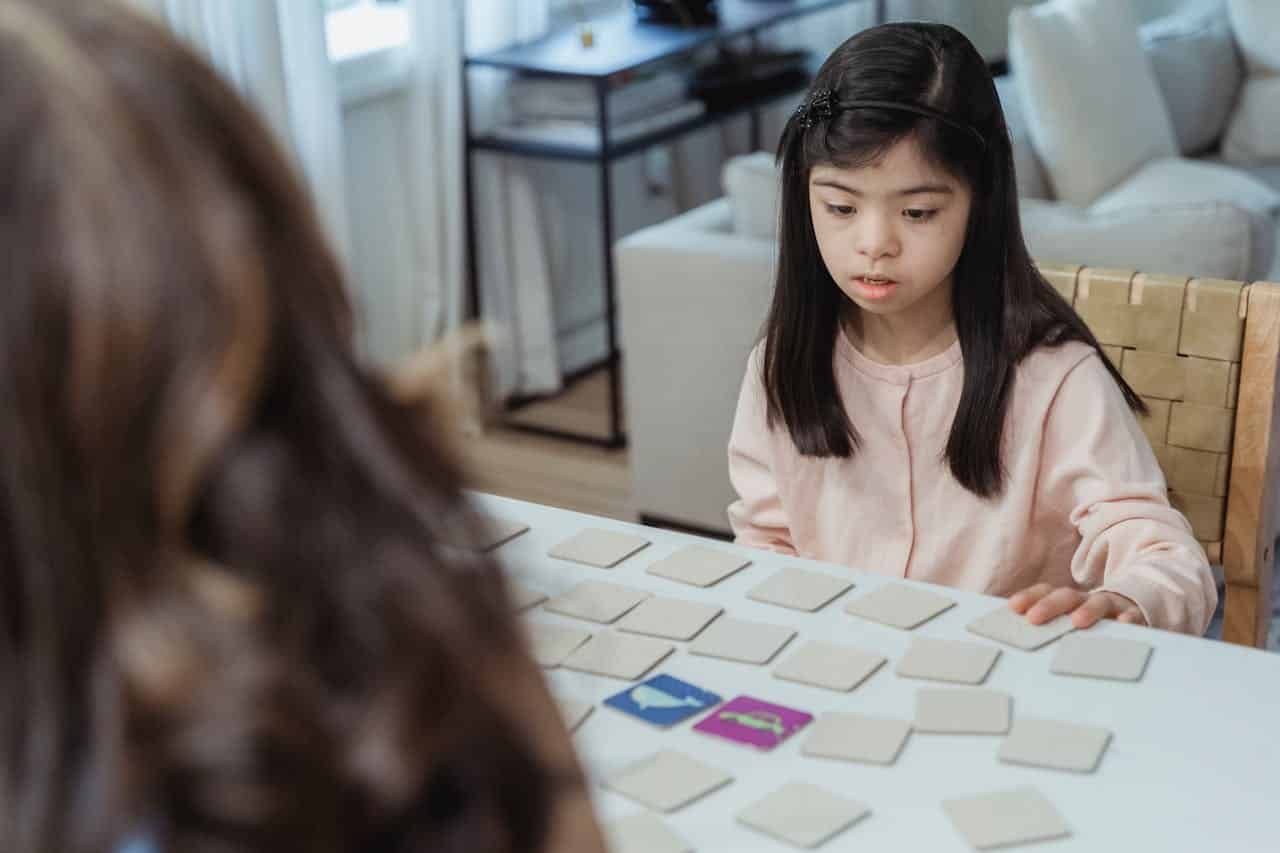Hey there, awesome parents and caregivers! Ready to dive into the colorful world of ABA therapy games? Buckle up, because we’re about to explore how these fun activities can help your child with autism spectrum disorder reach their full potential. Let’s turn your house into a playground of learning and watch your little star shine!
Why ABA Therapy Games? Because Learning Should Be a Blast!
First things first – what’s the deal with ABA therapy games? Well, imagine if your child’s favorite playground had secret superpowers to teach new skills. That’s essentially what we’re talking about here! These games are designed to help your child develop crucial abilities while having so much fun, they won’t even realize they’re learning.
Success Stories
“Move Up ABA has been a lifeline for our family. Before starting therapy, our son struggled with daily routines and communication. Now, he’s more independent and even initiated a conversation with a classmate for the first time! The progress we’ve seen in just six months is truly remarkable.”
- Emily R., Silver Spring, Accountant
“As a single dad, I was overwhelmed trying to manage my child’s behavior. The Move Up ABA team not only provided amazing support for my little girl but also taught me practical strategies to use at home. Their in-home sessions fit perfectly with our busy schedule. I’m so grateful for their patience and expertise.”
- Michael T., Rockville, Middle School Teacher
“We were hesitant about starting ABA therapy, but Move Up ABA’s approach put us at ease from day one. Our twins have made incredible strides in their social skills and self-regulation. The therapists are like extended family now, and we couldn’t be happier with our decision to work with them.”
- Aisha and James L., Simpson, Police Officers
The Power of Play: More Than Just Fun and Games
For many children on the autism spectrum, structured play is like a magic key that unlocks learning. It’s in this natural environment that we can introduce ABA strategies and watch the magic happen. From building social skills to boosting fine motor skills, these games are like a toolbox filled with everything your child needs to grow and thrive.
Home ABA Therapy Activities: Turning Your Living Room into a Learning Lab
Who says therapy only happens in a clinic? With home ABA therapy activities, you can keep the learning going 24/7. Let’s explore some ideas that’ll have your kiddo begging for “just one more game!”
1. The Classic Memory Game: Not Just for Elephants!

This oldie but goodie is a great game for boosting memory, focus, and even social skills.
Here’s a fun twist: create custom cards featuring your child’s favorite animals or characters.
For example, if your child loves dogs, make memory cards with different dog breeds. As they match the pairs, you can practice making animal sounds together – woof woof!
2. Musical Chairs with a Twist
Who doesn’t love a good game of musical chairs? Add some verbal cues or color identification tasks before sitting down, and voila! You’ve got yourself an ABA therapy powerhouse.
Try this: before sitting, your child has to name the color of the chair. “Red chair!” they might shout before plopping down. It’s a fun way to work on color identification and following instructions.
3. Board Games: More Than Just Moving Pieces
Board games are a goldmine for teaching turn-taking, following instructions, and even learning math skills. For instance, Chutes and Ladders can teach counting and number recognition. “Great job! You landed on number 15. Can you find the number 1 and 5 on the board?”
4. Sensory Scavenger Hunt
Hide items with different textures around the house and let your child explore. It’s like a treasure hunt for their senses!
You could hide a soft teddy bear, a smooth ball, and a rough piece of sandpaper. As your child finds each item, encourage them to describe how it feels. “Is it soft or hard? Smooth or rough?”
5. Puzzle Time: Piece by Piece
Puzzles are fantastic for developing fine motor skills, hand-eye coordination, and problem-solving. Start with a small number of pieces and work your way up!
For younger children, try a puzzle with large, chunky pieces of familiar objects like fruits or vehicles. As they place each piece, you can practice naming the objects together.
Positive Reinforcement: Catching Your Child Being Awesome
In ABA therapy, we’re all about celebrating those positive behaviors. Did your child complete a task or use eye contact?
Time for a mini dance party! This encouragement helps your child associate learning with fun, making them more likely to repeat those desired behaviors.
For example, if your child successfully asks for a snack using their words instead of pointing, you might say, “Wow! You used your words to ask for a snack. That’s awesome! High five!”
Visual Supports: A Picture’s Worth a Thousand Words
Many kids with autism are visual learners. Using visual supports in your games can be a game-changer. Think picture schedules for your daily routine or visual instructions for crafts.
For instance, you could create a visual schedule for bedtime routine with pictures showing “brush teeth,” “put on pajamas,” “read a story,” and “go to sleep.” This can help your child understand and follow the sequence of events more easily.
Adapting Games for Every Child: One Size Doesn’t Fit All
Remember, every child is unique, and what works for one student might not work for another. Don’t be afraid to get creative and adapt games to fit your child’s needs and interests. The sky’s the limit!
Beyond the Living Room: Taking ABA Therapy Games Outside

Who says learning can’t happen in the great outdoors?
Take your games outside and let Mother Nature join the fun. From shape recognition with clouds to a nature-themed scavenger hunt, the possibilities are endless!
Try this: go on a “color walk” around your neighborhood. Ask your child to find something red, then something blue, then something green. It’s a great way to practice color identification and observation skills.
Arts and Crafts: Where Creativity Meets Learning
Break out the crayons and glue sticks! Arts and crafts projects are a fantastic way to work on fine motor skills, following instructions, and unleashing creativity.
Plus, you get a fridge-worthy masterpiece at the end! For example, try making a collage with different textured materials like cotton balls, sandpaper, and fabric scraps.
This activity works on fine motor skills (cutting and gluing) and sensory exploration at the same time.
The Power of Music: Rhythm, Rhyme, and Learning Time
Let’s face it – kids love music! And guess what? It’s a powerful tool for learning too. Incorporating musical instruments or even simple rhythmic activities can work wonders for many children with autism.
Try this: use a drum (or even a pot and wooden spoon) to practice patterns. Start with a simple beat like “tap-tap-pause-tap” and see if your child can copy it. This activity helps with auditory processing, motor skills, and even turn-taking.
Tech-Savvy Learning: Apps and Games for ABA Therapy
In today’s digital age, we can’t forget about the power of technology. There are many apps and computer games designed specifically for children with autism that can complement your ABA therapy activities.
For instance, there are apps that help with emotion recognition, where children match facial expressions to emotions. Just remember – screen time should be balanced with plenty of hands-on, real-world activities!
The Parent’s Role: You’re the Real MVP
As a parent, you play a crucial role in your child’s ABA therapy journey. By incorporating these games into your daily routine, you’re creating countless opportunities for growth and learning. And the best part? You get to have fun right alongside your kiddo!
Expectations vs. Reality: Keeping It Real
Now, let’s have a quick reality check. While these games can work wonders, it’s important to keep your expectations realistic.
Some days will be all smiles and high-fives, while others might feel like you’re herding cats. And you know what? That’s totally okay! Every attempt is a step forward, even if it doesn’t feel like it in the moment.
Free Resources: Because Who Doesn’t Love Free Stuff?

Good news, budget-conscious parents! There are tons of free ABA therapy resources out there.
From printable games to online communities sharing ideas, you don’t have to break the bank to support your child’s growth.
Check out autism support websites or your local library for free resources and ideas.
Wrapping It Up: Let the Games Begin!
There you have it, folks! A treasure trove of ABA therapy games and activities to help your child learn, grow, and have a blast doing it. Remember, the goal here is progress, not perfection. Celebrate every tiny victory, laugh through the challenges, and most importantly, enjoy this special time with your child.
At Move Up ABA, we’re here to support you every step of the way. Whether you need more game ideas, help adapting activities, or just a virtual high-five, we’ve got your back. Our team of ABA professionals is ready to help you create a personalized plan that fits your child’s unique needs and your family’s lifestyle.
Ready to turn your home into the ultimate ABA therapy playground? Let’s get this party started! Reach out to Move Up ABA today, and let’s work together to unlock your child’s full potential. Game on!
400 E Pratt St, Floor 8 Baltimore , Maryland 21202, United States
Questions?
Email Us: intake@moveupaba.com
Call Us: (410) 469-1090






